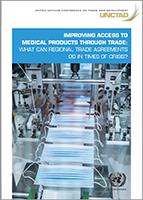
The criticality of maintaining trade flows of essential medical products and protective equipment during the COVID-19 pandemic cannot be emphasized more. The speed and the scale of the pandemic made it necessary to keep trade channels of such products open and eliminate traditional hurdles to trade to minimise all unnecessary costs and delays. The sense of urgency, and the reliance of many countries on imports for medical goods, highlight a need to simplify and streamline customs procedures and technical regulations.
The way the pandemic unfolded has exposed some loopholes in the capacity of the current trading system. Building an international trade environment that can respond to such threats effectively and efficiently is the first step towards better response, and regional trade agreements (RTAs) are a good potential platform to accomplish this. Specifically, provisions on regulatory cooperation in RTAs can aid countries to quickly respond to medical emergencies by simplifying unnecessary burdens posed by technical regulations.
Enhancing “regulatory cooperation” through simple efforts such as increasing transparency and enhancing consultations among cross-border regulatory agencies, as well as more complex undertakings such as mutual recognition and harmonization of standards and conformity assessment procedures – can enable countries to trade better during emergency situations.
Based on a review of 107 RTAs and an examination of country efforts to reduce regulatory divergence in order to facilitate trade in medical goods during the pandemic, this study attempts to advance the discussion on the need for emergency provisions in RTAs, culminating into a proposal for model RTA provisions. All proposals are built upon the various strengths as well as shortcomings of existing RTAs and regulatory cooperation measures adopted by countries during COVID-19.
The findings from RTAs and country case studies point towards the need to incorporate specific, temporary, or emergency provisions into RTAs that can facilitate regulatory cooperation and ensure that trade in medical goods flows unhindered during crises. Such ready-to-apply regulations and action plans would reduce uncertainty during the already difficult times.
The key to solid emergency provisions in RTAs is to base them on predefined “criteria”. The recommendations of this study makes some proposals to this end, for example: to clearly define a situation of “public health emergency” or a “shortage” of essential goods; to classify, at a tariff line level, “essential” goods that could be critical during an emergency; to agree to temporarily adopt international standards as a basis for regulatory cooperation; to treat as equivalent standards of jurisdictions with similar regulatory frameworks, among others. Specifying a start and an end date of such temporary measures would help provide more legitimacy to the provisions.
Further from these criteria, the study offers some “model provisions” that can be a starting point for RTA negotiators to build upon. The objective of enlisting these model provisions is to establish a formal basis for advancing regulatory cooperation in a quick and smooth fashion, while making good use of available mechanisms and possibilities.


